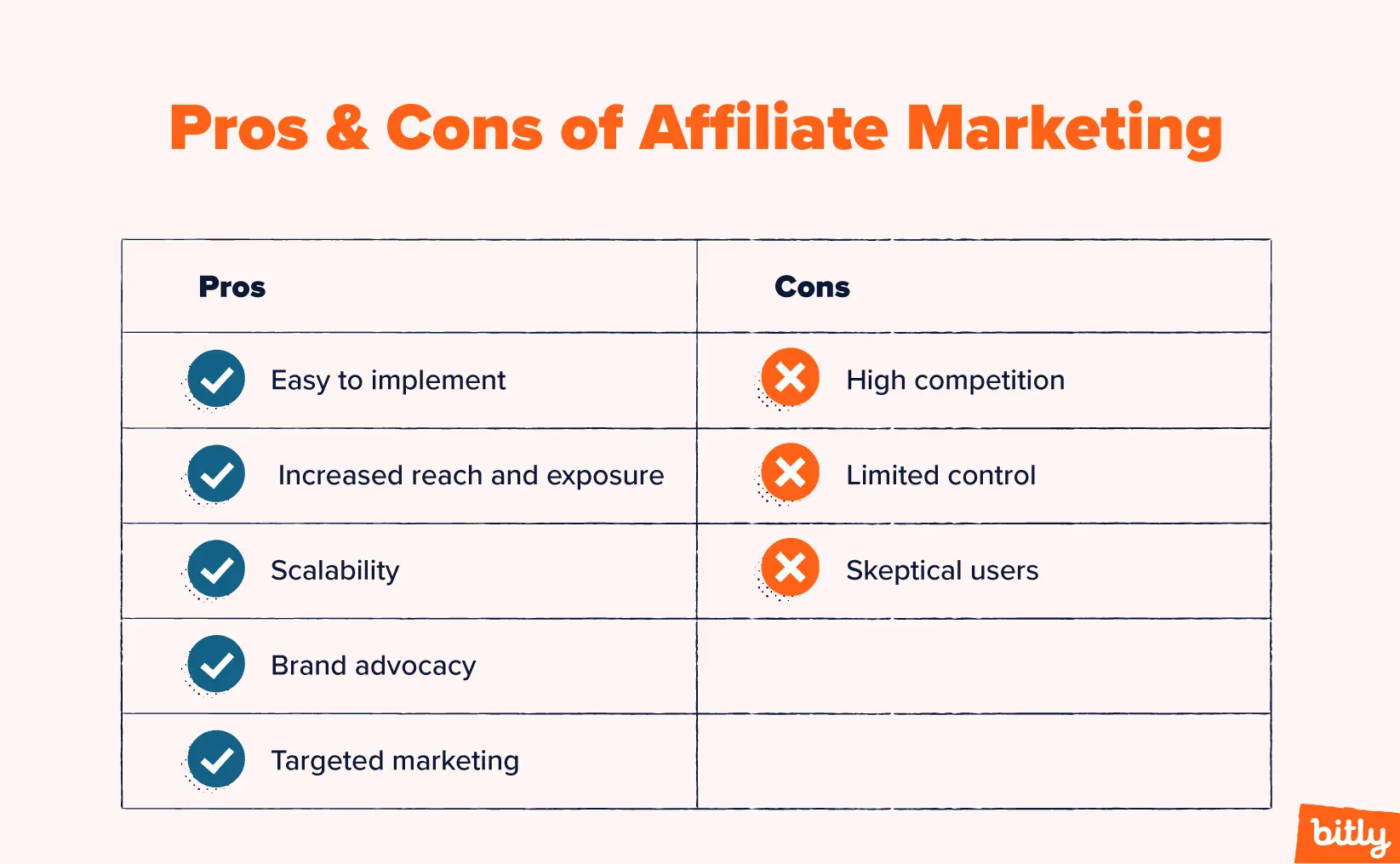If you’re new to the affiliate marketing business, one of your biggest questions is probably whether or not it’s a worthwhile venture. Affiliates use affiliate marketing to generate a passive income stream—but what do the businesses marketing affiliate products get out of it?
As it happens, quite a lot! It won’t cost you a lot of money, but when you’re working with affiliates publishing high-quality content featuring your products, it will generate a lot of buzz.
Ready to learn more? We’ll show you how affiliate marketing works, why it’s worthwhile, and a step-by-step process to help you get started.
What is affiliate marketing?
Affiliate marketing is a simple concept. You, as a business with a product to sell, contract an affiliate to help you market those products. Affiliates are typically people with reach, including but not limited to:
- Influencers with widespread social media posts
- Popular YouTube channels or podcasts with lots of subscribers
- Popular TikTok users
- People who run email lists
- Entrepreneurs who run review websites (where your product would be relevant)
How does affiliate marketing work?
Affiliate marketing is all about generating leads and making sales. When you contract with an affiliate, you provide affiliate links to those individuals they’ll use in their published materials.
For example, if you’re forming partnerships with influencers, you’d provide the influencer with affiliate links that they can post on social media when they’re showcasing your product.
Or, if you’re working with a review site, you’d provide the reviewer with affiliate links that they can put in their reviews. They’ll write the review, handle SEO and on-page optimization, and make sure your affiliate links are included somewhere clickable to drive customers to your site.
Those links are crucial because their link-tracking element allows you to track who clicks them and the actions those people take. For some affiliate programs, generating traffic is the goal—and that means you and your affiliate marketers will use those links to track clicks. From there, you’ll pay your affiliates a small commission on a pay-per-click basis.
More commonly, affiliate links are used to generate sales. In these cases, the affiliate links you provide will track people who click those links and then purchase. You’ll pay the affiliate a commission for that purchase.
Yes, affiliate marketing is worth it
Many businesses and their marketers wonder if affiliate marketing is worth it, especially since the affiliates are often advised to look for commissions up to 30% of the sale price.
The short answer? Yes: Affiliate marketing is totally worth it!
The affiliate marketing industry is huge. It’s packed with individuals and affiliate marketing platforms that have enormous reach. Consider what happens when you provide affiliate links to a popular influencer or review site. Yes, you’ll get some sales from affiliate link clicks, which is valuable in and of itself.
But even better, you’ll also get a lot of publicity. It’s impossible to get exact numbers since most affiliates don’t share their conversion rates, but most estimates say that the average affiliate marketing conversion rate is between 0.5% to 1%. This means that between 100 to 200 people have viewed your product (at minimum) for every affiliate link sale you make.
That kind of reach is incredibly valuable. Just because these people haven’t purchased yet doesn’t mean they won’t. Often, when people run across your product in the hands of an influencer or on a review site, they’re still in the initial discovery and research phases.
The more you get the word out about your product through affiliate marketing and other digital marketing strategies, the more your sales will increase.
The pros and cons of affiliate marketing
Affiliate marketing has a lot of advantages that make it extremely worthwhile for businesses who want to broaden their reach—but that doesn’t mean there aren’t some disadvantages, too. We’ll assess the pros and cons so that you can better assess whether it’s a good move for your business.

Pros
Let’s get started with some of the biggest advantages of affiliate marketing:
Easy to implement
There are no content marketing strategies that are easier to implement than affiliate marketing programs—and that’s because when you work with affiliates, you’re essentially contracting much of the content generation and marketing aspects out to affiliates in exchange for commissions. All you need to do to implement affiliate marketing into your overall strategy is join an affiliate marketing platform so that marketers can apply to join your affiliate program.
Increased reach and exposure
It’s not affiliate sales that are the big advantage of affiliate marketing. Rather, it’s the increased reach and exposure. Whether you rely on new affiliates or well-known influencers, they’ll put your product in front of their audiences, giving you incredible exposure.
Scalability
It’s super simple to scale your affiliate marketing program, too. All you need to do is determine what your affiliate marketing spend should be, then work out commission rates that fit the needs of both yourself and your affiliate partners, then contract more affiliates. The more affiliates you’re willing to contract, the further you can scale your affiliate marketing efforts.
Brand advocacy
When you work with affiliates, no matter what channels they use to promote your products, they become brand advocates—which can only be good. Brand advocacy is word-of-mouth marketing that helps elevate your brand and products among consumers. When people advocate for your products, they’ll create positive buzz while referring new customers.
Targeted marketing
Affiliates are also a huge help when it comes to targeted marketing. Targeted marketing identifies narrow market segments, then places your marketing materials in front of consumers from that group.
Affiliates make this process easier because each has its own target audience with its own unique qualities. You’ll be able to pick and choose from affiliates with particular audiences to those that align with your ideal customer demographic.
Cons
There are drawbacks to everything—and affiliate marketing is no exception. Here are the cons to prepare for if you’re considering adding affiliate marketing to your overall digital marketing strategy.
High competition
The affiliate marketing scene is huge. And when a scene is as big as that? It becomes incredibly competitive. You’ll have to compete to land a spot with the best affiliates with the broadest reach among your target audiences.
Remember, too, that very few affiliates limit themselves to marketing for a single brand. Most take on multiple brands, which means they may be promoting competing brands, too.
Limited control
While you can provide some materials for affiliates to use in their campaigns, by and large, most affiliates will create their own original content—and that leaves you with limited control over how your product and brand are represented.
Often, this is a good thing because it presents your brand in a fresh new light, but when promotions are poorly executed or when you or your products are misrepresented, it can potentially harm your reputation. That’s why it’s crucial to thoroughly vet your affiliates to ensure they consistently create content that aligns with your needs.
Skeptical users
Among general audiences, affiliate marketing is often associated with spammy content or disingenuous content. Some see blogs with affiliate disclosures or social posts with the #ad hashtag and assume the content is biased.
Even so, it’s always best to disclose when you’re using affiliate links—even though some viewers find it off-putting. It’s all part of building trust with your audience.
When you disclose affiliate links shows viewers that you’re approaching them with transparency. Build on that budding trust by also ensuring you avoid using questionable links and hashtags in your affiliate marketing campaign. Branded links and carefully chosen hashtags can signal an ethical brand rather than one intent on cranking out as much spammy content as possible.
How to leverage affiliate marketing effectively for your business
Ready to make affiliate marketing one of your marketing channels? We’ll show you how to build a successful affiliate marketing program, connect with bloggers and other affiliates, and nurture relationships—all to ultimately benefit your bottom line. Read below for details.
Build an affiliate marketing program
The first step to leveraging affiliate marketing is to build an affiliate marketing program. Your program should showcase your products in the best light and attract great affiliates to help you promote those products.
The first step in building your affiliate program is to think about the Three Ps: products, pricing, and promotions.
Start by figuring out which of your products you’d like to promote. Some marketers will promote their brand’s entire range of products, but since you’ll be paying commissions to affiliates, it often makes more sense to focus on high average order value (AOV) products. That gives you more leeway to create attractive commission packages for affiliates.
Once you select the products to include in your program, it’s time to consider pricing. Affiliate commissions span the gamut, anywhere from 1% to as high as 60% of the order value. Between 15% and 30% is the average. Consider that higher affiliate commissions will attract bigger and better affiliates, and use that information to guide you as you work out the ideal commission rates for your program.
Last comes promotions. You can help your affiliates generate a much higher conversion rate—which means more sales for you—by giving affiliates the tools to offer deals like free shipping on orders over a certain value, first-time buyer discounts, buy-more-save-more discounts, and other perks.
Connect with affiliate networks
Once you complete the steps above, it’s time to join an affiliate network. These platforms connect businesses like yours with affiliates who can market your brand. They’ll also be the source of the affiliate links you’ll need.
There are quite a few options out there, including platforms like Rakuten, ShareASale, and CJ Affiliate. Do your homework to choose networks that best fit your needs.
Develop attractive promotional materials
While your affiliates usually generate most of the content needed to market your products, you’ll have to provide some of your own, too. Beautiful product photos are a big help, and you can also develop things like infographics, tutorials, charts, data and spec sheets, and other materials that affiliates can use to round out the content they’ll develop for you.
Use affiliate links to track performance
Affiliate links are what make affiliate marketing possible. When you join an affiliate network and hire affiliates, they’ll be able to use the network platform to create links they can use in their campaigns. What makes an affiliate link special is that it contains a unique identifier that allows you to track clicks and sales.
You (and your affiliates) will use that information to indicate when you’ll need to pay commissions to your affiliates and track link performance. Keep track of metrics like click rates and conversion rates to continuously improve your affiliate marketing campaign.
Nurture relationships with affiliates
As you gain experience with affiliate marketing, it’s smart to nurture relationships with the affiliates bringing in the best conversion rates. Building a strong relationship with your affiliates not only encourages them to keep successfully promoting your products but can also open up new opportunities—like bringing in popular influencers on cross-channel marketing campaigns.
Ultimately, it’s all about partner engagement, which is a lot like that old saying: “A rising tide lifts all boats.” Affiliates who are engaged with your brand will market enthusiastically, translating into an engaged audience who is also enthusiastic about your offerings.
Get better results from your affiliate links with Bitly
One way to get better results from your affiliate marketing efforts? Create branded links with Bitly. They’re a great way to help your affiliates add polish to their marketing materials—plus, branded links can help you build trust and authenticity. With Bitly, you can even track link performance and other essential metrics, too.Ready to get started? Sign up here and learn how Bitly can help with affiliate marketing.




